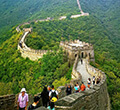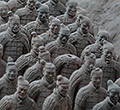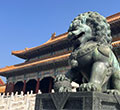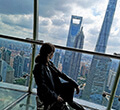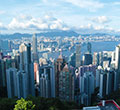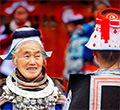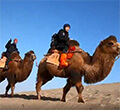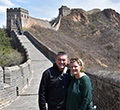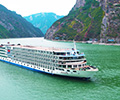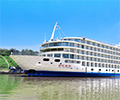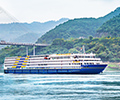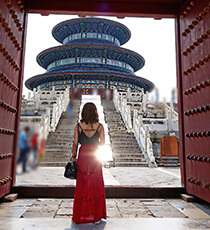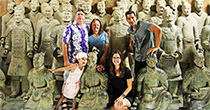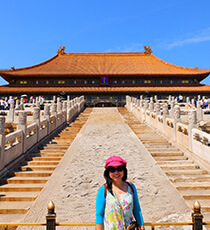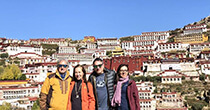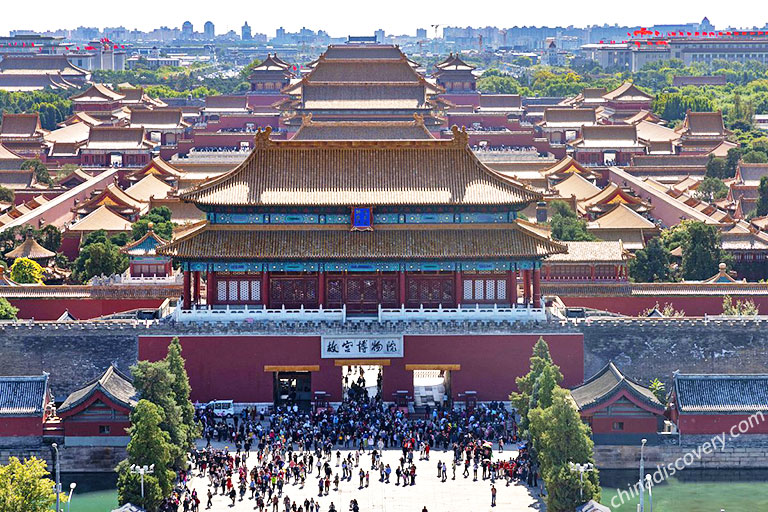How to Make Payment in China & Currency Exchange 2025
Don't fret about paying in China! While cash was once king, rumors of a cashless society can be misleading. China is embracing foreign visitors, and especially in popular tourist destinations like Beijing, Xian, Shanghai, and Chengdu, you'll find a variety of payment options to make your travels smooth. In Beijing, Shanghai, Hainan and many other places, many stores start to use POS machines that supports foreign cards. Alipay and Wechat have simplified the process of verification. You can even find many Foreign Guest Payment Service Centers in the airports of Beijing, Xian, Chengdu, Zhangjiajie, Kunming, etc where you can go to consult and experience digital mobile payment, exchange currency and withdraw cash.
Payment Methods in China
Credit and debit cards may not cover all your expenses in China. With the widespread popularity of digital payments, many businesses no longer offer point-of-sale (POS) systems for credit and debit card users. However, you can still use your bank cards via POS systems at selected hotels, shopping malls, and larger restaurants. Cash is still widely accepted. It is also very reliable. You’d better always bring some cash with you including some small changes.
Digital payment is the norm in China, with Alipay and WeChat Pay leading the way. Since July, 2023, they've started accepting international cards through their apps, though success may vary depending on the user's country and bank.
- How to Use Alipay (Zhifubao) in China
- How to Use WeChat Pay (Weixin Pay) in China
Chinese Currency
Renminbi (人民币) or RMB is the official currency of China, and it means “people’s currency” in Chinese. The basic unit of RMB is yuan (元), and the sign of yuan is ¥. CNY is the abbreviation of Chinese yuan, which is also been used widely to refer to Chinese currency. The subordinate units of yuan is jiǎo (角) and fēn (分), and one yuan equals 10 jiao and one jiao equals 10 fen. At present, fen is too cheap to purchase anything, thus, there is almost no circulation of fen on the market.
The denominations of Chinese banknotes are ¥0.1 (1 jiao), ¥0.2 (2 jiao), ¥0.5 (5 jiao), ¥1, ¥2, ¥5, ¥10, ¥20, ¥50 and ¥100. Coins are available in denominations from 1 jiao, 5 jiao and 1 yuan. Now, China is circulating the fifth series of Renminbi banknotes and it includes banknotes of ¥1, ¥5, ¥10, ¥20, ¥50 and ¥100. And 2 yuan banknote stopped issuing since the fifth series of Reminbi, so ¥2 banknote is rarely to be seen on the market.

Notice:
(1)Chinese people often call yuan as “kuai”, both of the two pronunciations are used among China. For example, 1 yuan can also be called as 1 kuai.
(2)Renminbi is the legal tender in mainland China, however, Hong Kong, Macau and Taiwan has different currencies. Hong Kong is Hong Kong Dollar (HKD $), Macau is Pataca (MOP $) and Taiwan is New Taiwan Dollar (NT $). Some stores in Hong Kong and Macau also accept Renminbi, and it’s easy to exchange Renminbi in those places to local currencies.
Currency Exchange
Even though China has quickly adopted mobile payment systems like WeChat and Alipay, they are not available for every foreign tourist. Credit cards aren't readily accepted especially in small stores, local markets, etc. Cash is still king for international tourists. It's advisable to plan your currency exchange needs in advance to ensure you have the necessary funds during your stay in China. You can exchange some Chinese cash in your home country, as your “emergency fund”. But please note, as Chinese Customs regulations, each traveler is advised to ensure they carry no more than RMB 20,000 in cash when entering the country.
After arriving in China, you can find many places to exchange Chinese currency, such as the exchange vendors in the major international airports, hotels, offices of local banks, and ATMs across the region. Exchanging major international cash, such as U.S. Dollars, Euros, Pounds, etc. into Chinese Yuan is not difficult in China. The exchange rates are regulated; however, the commission fees are varied from different banks, hotels and airports.
The Banks - the most reliable way to exchange money in China. Banks will offer the most reliable exchange rate with the least amount of risk, but you may have to wait in long lines.
Exchange vendors - can usually be found in the airport and hotels. The exchange rate is not as good as banks but the convenience is sometimes worth it.
ATMs - the quickest and easiest way to get money in China is to use the China bank ATMs which can be found easily in bigger cities. Most Chinese ATMs will show a sign above that indicates whether or not they accept Visa, MasterCard and Diner’s Club. The exchange rate will be good, but you’ll likely be charged a fee, both from the Chinese bank and from your bank at home. All ATM machines in China have instructions in English and you can follow the instructions to cash the money. ATMs in China will dispense cash first, and then return your card. This may be opposite to some countries where return card first and then dispense money. So remember to pick up your card after you cash the money.
Can I use my Credit Card or Debit Card in China?
You might be able to use your credit card or debit card in China, but it depends on a few factors:
Card network: Visa, Mastercard, JCB, and Discover are generally accepted in China, especially in major cities and tourist areas. However, American Express acceptance is less common.
Location: Larger stores, hotels, and restaurants in major cities are more likely to accept foreign cards than smaller shops or rural areas.
Specific merchant: Even within major cities, some individual businesses might not accept foreign cards.
Your bank: Check with your bank to see if they have any foreign transaction fees or limitations on using your card in China.

Here are some alternative options to consider:
Cash: Carrying some Chinese Yuan (RMB) is always a good idea, especially for smaller purchases or taxis.
Mobile wallets: Linking your foreign credit card to a mobile wallet app like Alipay or WeChat Pay (if your bank and the app allow it) can be a convenient way to pay in many places, especially in larger cities.
UnionPay card: If you travel to China frequently, consider getting a UnionPay card, which is the most widely accepted card network in China.
How to Identify Counterfeit Money
Travelers may receive counterfeit banknote in the travel, especially the banknote of ¥100 and ¥50, so knowing simple ways to identify the counterfeit money is very necessary. Just like other currencies, the main ways to identify the fake money are by watermark, color change, texture and braille dots, etc.
1. Feel the texture of Chairman Mao’s collar and the braille dots besides him, the texture of these parts are rough; while the fake money doesn’t has this texture and feels smooth.
2. Hold the bill against the light with the Mao side facing you, you can see two watermarks, one is the image of Chairman Mao on the left blank space, and another is the number equal to the value of the bill on the left bottom next to the denomination number.
3. The color of the denomination number on the left bottom of the Mao side will change from different angle. For the ¥100 banknote, the number is green when you look from the front and will change to blue when you tilt the banknote upward. As for the ¥50, the number is golden from the front and turns to green when you tilt the banknote upward.
4. In the upper right corner of the Mao side, you can see an oval shape under the denomination number. Hold the banknote to the light and tilt is in a sharp angle, you can see a number in the oval equal to the value of the bill.
If you are unlucky to receive counterfeit money, please give it to the bank so that they can destroy the counterfeit money to reduce the circulation of the fake money.
Worry-free China Vacation with China Discovery
China Discovery is a professional and experienced travel companion who offers high-value and worry-free China vacation packages. We not only offer classic China vacation packages, but also in-depth tours of all Chinese destinations and special theme tours to help you discover the REAL China. Since we believe that every trip with China Discovery should be tailored to the traveler's needs, preferences, interests, and style of travel and accommodation, our professional travel consultants will work closely with you to design personalized travel plans that meet your specific requirements, whether you are traveling with your family, friends, or solo.
- Top 10 China Tour Packages
- Most Classic China Tours
- China Tours from Capital Beijing
- China Tours from Shanghai
- China Great Wall Tours
- China Giant Panda Tours
- China High Speed Train Travel
- China Yangtze River Cruise Tours
Keep Reading
Recommended Tours
Top 3 tours chosen by most customers to explore in the best way. Check the detailed itinerary, or tailor your own trip now with us.

10 Days Classic China Tour from Shanghai
Shanghai / Guilin / Yangshuo / Guilin / Xian / Beijing

7 Days Vibrant & Ancient China Tour from Hong Kong
Hong Kong / Shanghai / Beijing

7 Days Shanghai Beijing Contrast Tour by High Speed Train
Shanghai / Tongli / Suzhou / Beijing
Start planning your tailor-made holiday to China by contacting one of our specialists. Once inquired, you’ll get a response within 0.5~23.5 hours.
Customize a TripHave a question? Get answers from our travel experts or guests
- Your Question:
- Your Name:
- Your Email:
- Submit
